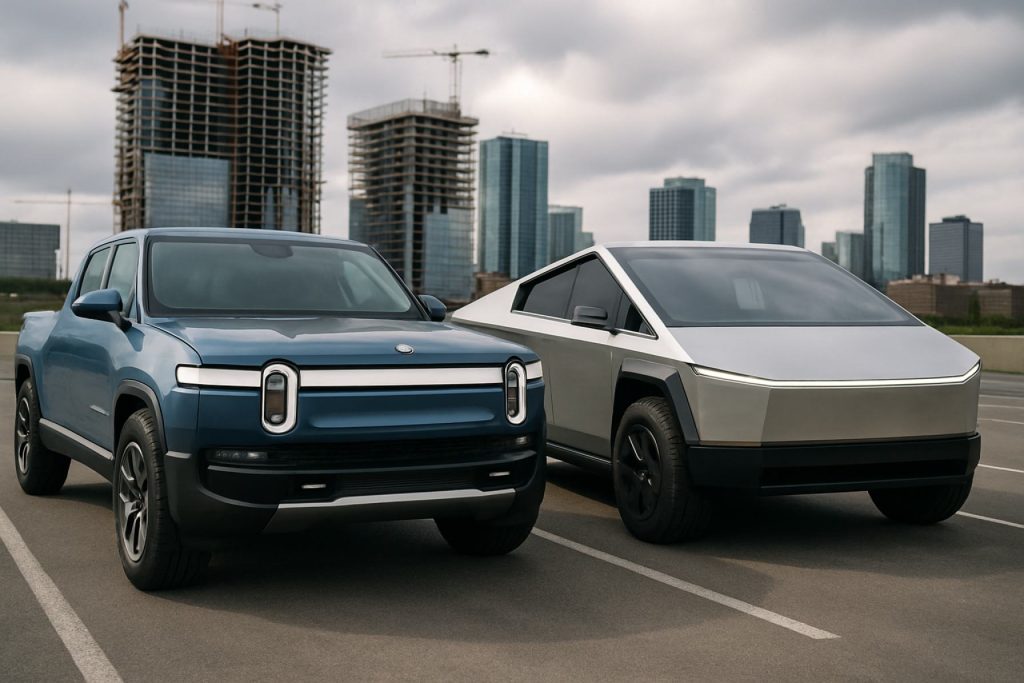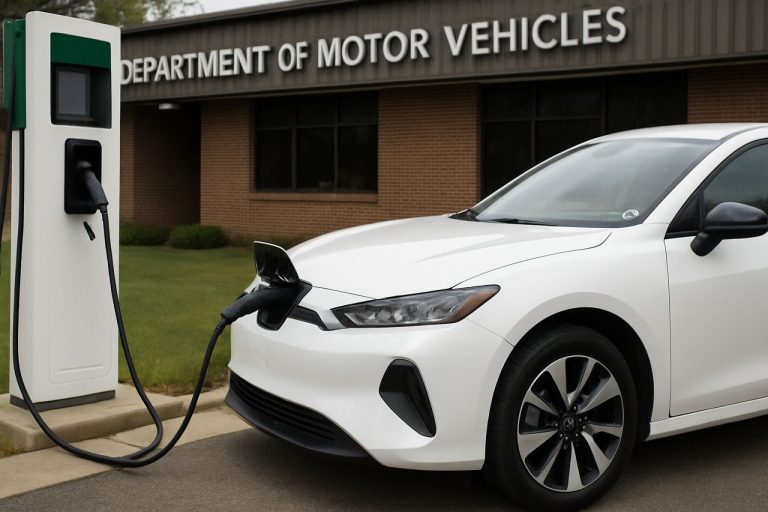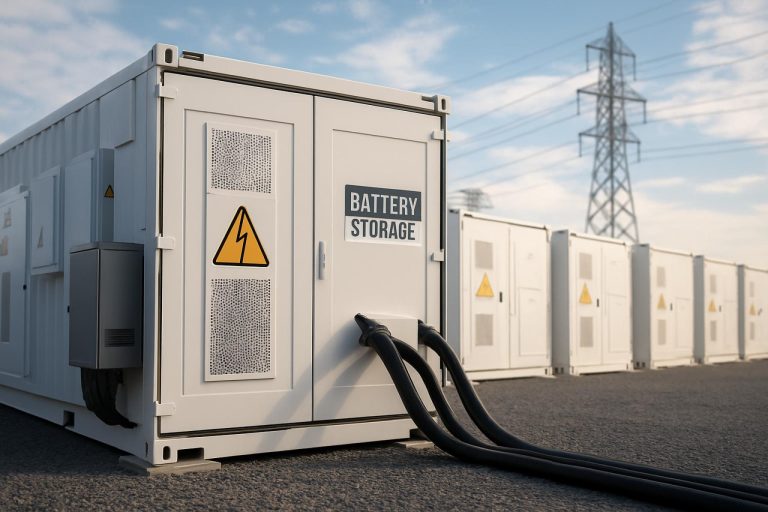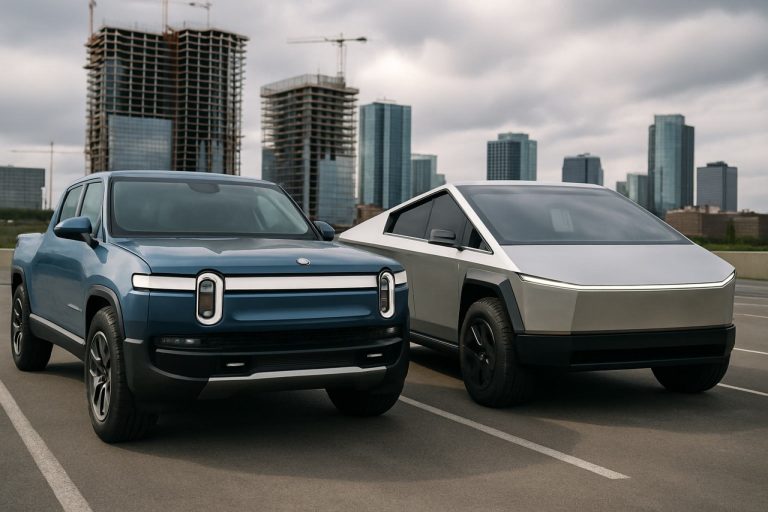
- Both Rivian and Lucid surged on their EV IPOs but now trade far below their highs amid challenging market conditions.
- Rivian has improved production, reached a positive gross margin, and expects $5.24 billion in revenue, with the upcoming R2 midsize SUV seen as pivotal for its future.
- Lucid struggles with missed production targets but hopes to nearly double deliveries and revenue, backed strongly by the Saudi Public Investment Fund.
- Competition among global and American EV automakers is escalating, intensifying the pressure on both Rivian and Lucid.
- Neither company is profitable yet; both face high volatility and are sensitive to supply chain and regulatory changes.
- Long-term success will require sustained innovation, operational excellence, and reliable vehicle delivery to stand out in the fierce EV industry.
The ambition crackled like high-voltage wires when Rivian and Lucid first rolled onto Wall Street. Both EV pioneers dazzled investors, their stocks surging to the stratosphere just months after debut—a testament to the global hunger for new energy vehicles, and to the outsized hopes these brands ignited. Now, those same tickers languish below $20 and $5, a far cry from their glory days. The question on everyone’s lips: can these fallen stars stage a comeback, or are they destined to fade away in the dust of the EV gold rush?
Rivian, a household name for adventure seekers and sustainability advocates alike, earned its reputation on the burly shoulders of its R1T pickup, R1S SUV, and electric delivery vans made for Amazon. Yet the path hasn’t been smooth. Supply chain bottlenecks buckled production, and the realities of mass manufacturing battered high expectations. Still, signs of a turnaround flicker beneath the surface. The company recently nudged its gross margin into positive territory—a crucial milestone for any aspiring automaker—and expects revenues to climb to $5.24 billion this year as it tightens costs and accelerates the rollout of its acclaimed vehicles.
Even more telling, the highly anticipated R2 midsize SUV looms as a make-or-break bet for Rivian’s future. The company has rebooted its Illinois plant, poured resources into cost optimization, and doubled down on high-margin software and service offerings. Analysts widely agree: if Rivian can navigate market headwinds, the R2’s successful launch could tip the balance from chronic losses to sustained growth.
Meanwhile, Lucid cuts a contrasting figure. Helmed by former Tesla talent at the outset, Lucid burnished its credentials with the record-breaking Air sedan—an electric marvel boasting class-leading range and luxury accoutrements. But delays and production shortfalls have dogged the company’s ambitions. Lucid missed its own delivery forecasts year after year, and only broke ground on its long-awaited Gravity SUV in late 2024.
Still, hope glimmers on the horizon. The Lucid team, now under fresh leadership, projects a near-doubling in production this year, aiming to put 20,000 vehicles on the road and raise revenue a dramatic 73%. Crucially, Lucid’s largest shareholder, the Saudi Public Investment Fund, continues to backstop the business, bolstering confidence that the company can weather financial storms even as losses mount.
For everyday investors, the calculus is fraught. Both companies are unprofitable, volatile, and susceptible to changes in government incentives and global supply chains. Yet each symbolizes a uniquely American type of risk: betting on the underdog to upend entrenched industries and electrify the future.
The key takeaway? Only resilient, innovative companies will survive the fierce EV wars. Rivian and Lucid still have time to prove themselves, but only those that consistently deliver—on the assembly line and in the marketplace—can expect a second act worth watching.
For readers looking to better understand the fast-changing EV landscape, more resources can be found at The Wall Street Journal and Bloomberg for trusted market insights. If you’re ready to take a close look at the next wave of American innovation, keep your eyes trained on what happens next at Rivian, Lucid, and the road ahead.
EV Underdogs or Future Titans? Insider Facts and Survival Strategies for Lucid & Rivian Investors
# Rivian and Lucid: Deeper Dives, Game-Changing Trends, and Can’t-Miss Insights
Electric vehicles (EVs) are more than a passing trend—they represent a seismic shift in how we move, invest, and think about the environment. While the initial market hype around Rivian and Lucid led to sky-high valuations, reality has since set in. For those tracking their futures—and wondering if these fallen stars can rise again—here’s what you need to know, what the headlines missed, and actionable advice you can really use.
—
New and Crucial Facts
Rivian: Beyond the Headlines
– Amazon Partnership is Massive: Rivian’s exclusive deal with Amazon for 100,000 electric delivery vans remains unparalleled in the industry, offering steady fleet demand and a crucial recurring revenue stream. This relationship helped buffer Rivian against volatile consumer markets ([source](https://www.cnbc.com)).
– Battery Innovation: Rivian is investing heavily in in-house battery development to secure its supply chain, reduce costs, and potentially enter the stationary energy storage market, following in Tesla’s footsteps.
– Software Revenue Streams: Alongside hardware, Rivian is focusing on over-the-air (OTA) updates, proprietary driver assistance systems, and future ride-sharing capabilities—each a potential multi-billion-dollar opportunity.
– Pricing & Features: The R1T pickup starts at approximately $73,000 (as of 2024), positioning it as a premium adventure vehicle. The forthcoming R2 SUV is expected to hit a lower, more competitive price point (speculated under $50,000), directly challenging Tesla’s Model Y and Ford’s Mustang Mach-E.
Lucid: What’s Under the Hood
– Longest Range in the Industry: The Lucid Air Dream Edition boasts an EPA-rated range of up to 516 miles—surpassing any Tesla model as of mid-2024. This is driven by high-efficiency, proprietary battery and motor technology ([source](https://www.caranddriver.com)).
– Luxury Segment Advantage: Lucid targets the high-end luxury market, directly competing with Mercedes-Benz EQS and top-line Teslas. Standard features include a glass canopy roof, massage seats, and industry-leading fast-charging (adding 300 miles in ~20 minutes under optimal conditions).
– Saudi Public Investment Fund (PIF) Backing: With over 60% ownership, the PIF offers unique financial stability, making Lucid less prone to bankruptcy risk compared to other startups.
– Future Models: After the Lucid Air and upcoming Gravity SUV, the company has teased more affordable, mass-market EVs for launch in late 2025 or 2026.
– Pricing & Features: The Air Pure model starts under $80,000, while higher trims exceed $100,000. Gravity SUV pricing is expected to start around $75,000.
—
How-To Steps & Life Hacks: Investing and Ownership
How to Evaluate EV Stocks Like Rivian and Lucid
1. Watch for Gross Margin Updates: Profitability metrics are key; positive gross margin shifts typically signal improved cost structures.
2. Track Production & Delivery Volumes: Consistent month-over-month growth is a bullish indicator. Missed guidance, on the other hand, can tank stock prices.
3. Follow Regulatory Announcements: U.S. and international incentives, tariffs, or tax credits heavily impact EV profitability and consumer adoption.
4. Scrutinize Cash Burn and Debt: Both companies have large war chests (especially Lucid), but high quarterly cash burn rates may necessitate fundraising or dilution.
Smart Ownership Hacks
– Maximize Incentives: Always check federal, state, and local EV rebates—up to $7,500 in the U.S. for qualifying models.
– Leverage OTA Updates: Rivian and Lucid frequently push new features, bug fixes, and performance upgrades via software—free for early adopters.
—
Real-World Use Cases
– Rivian: Adventure enthusiasts praise R1T’s off-road capability, water-fording depth, and gear tunnel innovation. Fleet operators (like Amazon) cite durability and total cost of ownership benefits.
– Lucid: Tech-forward professionals and luxury buyers are drawn by range, performance, and interior comfort. Many reviewers rate the Air as superior to Tesla’s Model S in driving dynamics and refinement.
—
Market Forecasts & Industry Trends
– U.S. EV Market Share: Expected to exceed 10% in 2024, with sustained double-digit annual growth through 2030 (Source: BloombergNEF).
– Premium/Luxury EVs: Demand remains robust even amid broader EV market slowdowns, with luxury customers less sensitive to economic cycles.
– Competitive Threats: Ford, General Motors, and Tesla are all accelerating new model rollouts, which puts pressure on both Lucid and Rivian to differentiate rapidly or risk being outpaced.
—
Reviews & Comparisons
– Rivian R1T vs. Ford F-150 Lightning: Rivian’s superior off-road features and lifestyle branding earn praise, but Ford wins on dealer network and initial pricing.
– Lucid Air vs. Tesla Model S Plaid: Lucid trumps Tesla on range and interior quality, while Tesla wins on raw acceleration and charging network breadth.
—
Controversies & Limitations
– Rivian: Delays in scaling up and unreliable early production frustrated reservation holders. Short-term layoffs and rumors of additional capital raises have raised concerns.
– Lucid: Chronic production misses and a slow sales ramp in Europe and the Middle East have dented perceptions. Some analysts question whether the luxury-only approach is sustainable long-term.
—
Features, Specs & Pricing (2024 Snapshot)
| Company | Flagship Product | Range (EPA est.) | Starting Price | Fast Charging |
|———|——————|——————|—————|————–|
| Rivian | R1T (pickup) | 314 miles | ~$73,000 | Up to 140 mi in 20 min |
| Lucid | Air Dream | 516 miles | ~$105,000 | Up to 300 mi in 20 min |
—
Security & Sustainability
– Advanced Safety Suites: Both companies bundle active safety features (lane-keeping, collision avoidance) standard. Rivian is actively testing full self-driving technology but lags Tesla in real-world data.
– Green Manufacturing: Both brands emphasize renewable-powered factories and recyclable materials. Rivian’s Normal, Illinois plant is one of the greenest in North America.
– Cybersecurity: OTA update capabilities make these EVs cyber targets; both companies invest heavily in encryption and multi-layered cyber defenses.
—
Insights & Predictions
– Rivian’s R2 Launch is Pivotal: Successful launch in 2026 could double Rivian’s total addressable market and swing it to profitability.
– Lucid’s Path Forward: If the Gravity SUV launch is on time and affordable sedan models follow, Lucid could double sales volumes by 2027. Failure would likely mean a pivot to niche luxury, with slower growth.
—
Most Pressing Questions Answered
Can Rivian and Lucid survive long term?
– Both have enough cash (especially Lucid, thanks to the PIF) for multiple years at current burn rates. Survival depends on meeting production targets and scaling new, affordable models.
Are quality and reliability issues persistent?
– Initial reports cite typical startup hiccups. Rivian’s early hardware recalls have declined; Lucid’s software bugs are resolved quickly via OTA patches. Both score high marks for customer satisfaction in recent JD Power studies ([source](https://www.jdpower.com)).
Should I buy the stock or the car?
– Owning the vehicle is relatively low risk due to robust warranties and OTA upgrades. The stocks are speculative, with high upside and high risk—not ideal for risk-averse investors.
—
Actionable Recommendations & Quick Tips
– For Investors: Limit position sizes, diversify holdings, and monitor quarterly earnings closely.
– For Shoppers: Place your reservation early to lock in current pricing as demand rebounds, and verify EV tax credit eligibility.
– For Industry Watchers: Track incentives, production ramp rates, and global expansion efforts to gauge real momentum.
—
Trusted Resources
– For analyses and EV market trends, consult [The Wall Street Journal](https://www.wsj.com) and [Bloomberg](https://www.bloomberg.com).
– For official updates and detailed specs, visit [Rivian](https://rivian.com) and [Lucid Motors](https://lucidmotors.com) (verified main domains).
—
Bottom Line
Rivian and Lucid are EV innovators, but their comeback stories hinge on execution, future model launches, and savvy management. If you’re betting on the next wave of American automotive success, track these brands closely—but remember, in the EV world, only the most adaptable survive.



